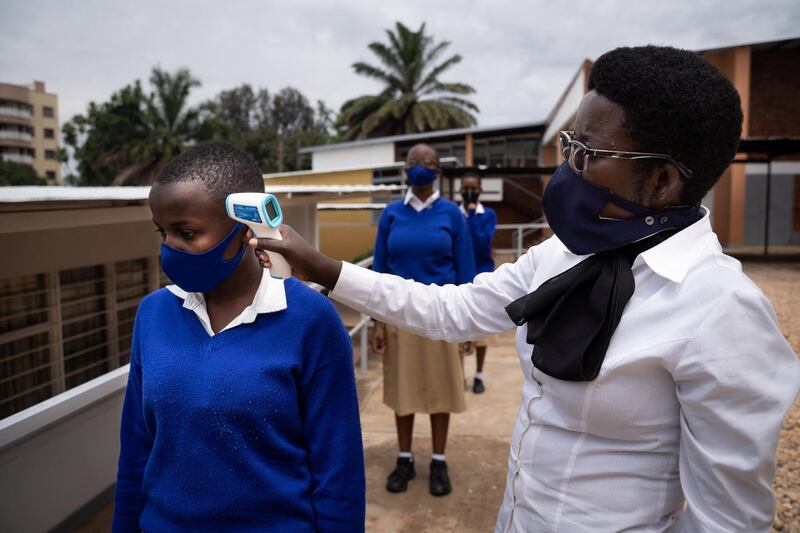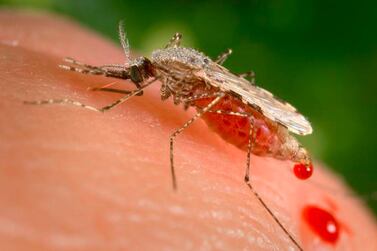Anyone in Kigali today will find it bustling again after two punishing lockdowns, but life is far from normal in Rwanda’s capital.
Huge banks of sinks and soap dispensers dot the city. Drones hover overhead, barking orders to mask up and keep a safe distance. At junctions, drivers, cyclists and pedestrians are tested at random by throngs of healthcare workers.
Last month, UK Transport Secretary Grant Shapps added Rwanda to the country's "red list". UK citizens and permanent residents arriving back from red list countries must now self-isolate in mandatory quarantine at approved hotels for 10 days, while other travellers from red list countries are barred from entering the UK.
While Mr Shapps said this was in response to new evidence showing “the likely spread of a coronavirus variant identified in South Africa”, Kigali was furious.
Rwanda's government said "the sparse information communicated to Rwanda does not stand up to scientific scrutiny" and demanded clarification over the "arbitrary decision".
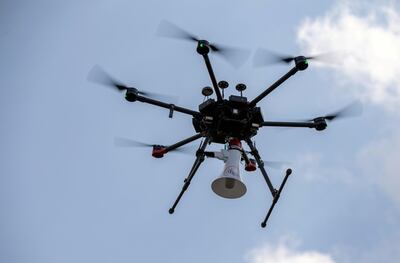
More than two weeks on, the tiny nation has successfully subdued a continent-wide second wave of Covid-19, restoring its reputation as one of the world's strongest and most tech-savvy pandemic responders.
Defined by innovation, decentralisation and high public trust, Rwanda strategy now offers a blueprint for countries not just in Africa, but worldwide.
In all, Rwanda has recorded almost 17,500 cases and 239 deaths. Belgium, which has roughly the same population, has tallied 739,000 cases and more than 21,700 deaths.
"The Rwanda story confirms that Covid does not change a system, it exposes a system," said Joachim Osur, technical director of programmes at Amref Health Africa, a medical care NGO. "Because the health system in Rwanda was functional and effective, it was easy for them to manage Covid."
Rwanda lives with the scars of its 1994 genocide, which saw up to a million Tutsis and moderate Hutus slaughtered by roving Hutu gangs. In its aftermath, the country's health system was rebuilt from scratch and has since weathered various infectious disease outbreaks – notably HIV.
When coronavirus struck, Rwanda’s systems and strategies kicked into gear.
"The main machines we are using for Covid testing are the HIV machines that were [already] there," Sabin Nsanzimana, director general of the Rwanda Biomedical Centre, which is in charge of tackling Covid-19, told NPR last year.
"We are using the same structure, same people, same infrastructure and laboratory diagnostics, but applying it to Covid testing."
Today, the Lowy Institute, a Sydney-based think tank, ranks Rwanda sixth in the world for its pandemic response – nine places above the nearest African country.
However, Rwanda's success was far from certain when Covid-19 first breached its borders last March.
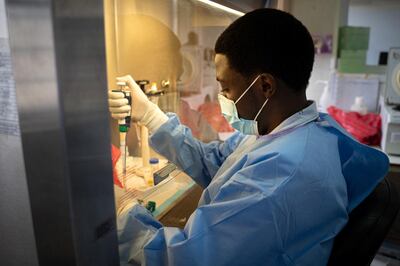
Despite averaging seven per cent GDP growth annually since 2000, Rwanda remains a low-income country and did not have an abundance of ventilators or hospital beds for its 12 million citizens.
Instead, the country’s first wave of Covid-19 was subdued with a rapid, free, random and aggressive testing campaign and a contact-tracing operation that put wealthy Western countries to shame. As of February 14 this year, Rwanda had conducted 948,000 tests.
On March 21, 2020, with 17 cases of the virus, President Paul Kagame's government became the first in sub-Saharan Africa to impose a total shutdown, which lasted six weeks, with a phased reopening plan. The country has maintained a fluid curfew.
An estimated 60,000 healthcare workers pounded the pavements, testing at random, not just in Kigali but nationwide. Those who tested positive were quarantined at dedicated clinics. Contact tracers – including community health workers, university students and police – then tracked down their contacts, and quarantined them while they were tested.
“The foundations of Rwanda's health system – which are steeped in years and years of trust-building and local empowerment – lend themselves extraordinarily well to confronting a virus that requires each individual to play a role,” said Eli Cahan, a journalist who has covered Rwanda's health system and is a researcher at Stanford's Clinical Excellence Research Centre.
The manner in which Rwanda decentralised its response – with national and regional command centres and elected community health workers at village level – quickly made it a darling of the World Health Organisation.
Rwanda also pioneered pool testing, which sees dozens of swabs tested at once, and then tested individually only if the group returns a positive result. That allowed the east African country, where GDP per person is just $2,000 and a Covid test costs up to $100, to lower costs and increase speed.

“Political will is key," said Mr Osur. “Compared say to Tanzania, political alignment to science has played a big role in fighting the pandemic [in Rwanda].”
Tanzania's President John Magufuli, has suggested Covid-19 is a hoax and has fuelled anti-vaxxer conspiracy theories.
Mr Kagame's government has credited the low caseload with public co-operation. Indeed, mobile phone data shows that Rwandans have been the second-best social distancers on the continent, after South Africans.
"When the government closes the borders and sends everyone home ... the people must know these actions are not against them, but for them," Agnes Binagwaho, a former Rwandan health minister and architect of its healthcare system, said in a recent interview with the British Medical Journal.
“That’s the only way they’ll comply with the guidance.”
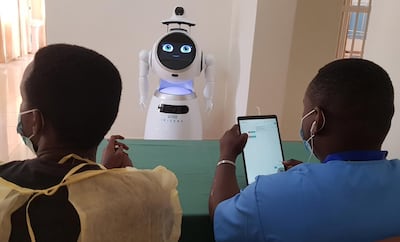
Perhaps most impressive, though, was Rwanda's technology-enabled approach, which saw robots deployed to clinics and airports to screen passengers, and drones taking to the air over streets.
Rights groups suggest fear could be a motivator in a country where Mr Kagame – a former rebel commander in power for almost 21 years – rules with an iron fist. Those breaking curfew or not wearing masks are reportedly forced to endure all-night lectures on the perils of the coronavirus.
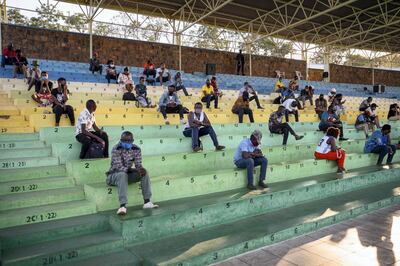
Still, the country was not immune to the second wave sweeping the region, witnessing its deadliest month so far in January, with more than half of Rwanda's total coronavirus deaths. The spike – which mainly affected the capital – came amid fears of a fast-spreading new variant, first identified in South Africa.
On January 18, Kigali was once again placed under a 15-day lockdown – ultimately extended by a week – and schools, businesses and churches were closed, leaving Africa’s cleanest capital deserted. Tens of thousands of needy households were supplied with food.
"Let no Rwandan worry where they will get their food for the next two weeks due to this lockdown. Institutions are around to assist," said local government minister Anastase Shyaka. "What we ask Rwandans is that they should fear Covid-19 more than they fear hunger."
From a pandemic peak of 574 new cases on January 26, the country’s new case count began to fall, dipping as low as 76 on February 14.
Rwanda is not out of the woods yet, but is among the six first African nations to get the Pfizer-BioNTech vaccine. On Sunday, the health ministry said it had started immunising healthcare workers with vaccines acquired "through international partnerships in limited quantities".
Later this month, it will begin getting doses from Covax, a global initiative to supply vaccines to low-income countries. Covax promises to vaccinate 20 per cent of Rwanda's population, supplying around two million doses.
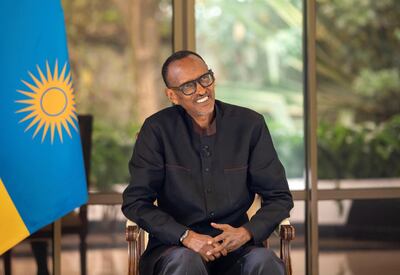
That has not stopped Mr Kagame from rebuking wealthy countries for buying up vaccine stocks.
"Ensuring equitable access to vaccines globally during a pandemic is not only a moral issue, but an economic imperative to protect the wellbeing of people everywhere," the Rwandan president wrote in The Guardian on February 7.
“But when will Africa get the protection it needs? If all lives are equal, why isn’t access to vaccines?
Last Monday, Kigali's lockdown was lifted, sparking relief among its residents. The Covid-19 pandemic, though, is ever-present; from the mask-wearing motorbike taxi riders to the eye-catching street murals quoting government health advice.
Despite the pain it has caused, the legacy of Rwanda’s strong Covid-19 response, and its use of technology, is likely to serve as an example to African countries for decades to come.
